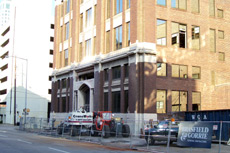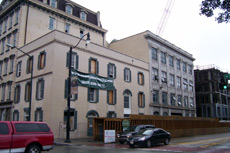I started out today writing an editorial about transit and how people’s perspectives are skewed based on how they’re looking at an issue – in particular, transit. After attending this morning’s city council meeting, I’m saving that one for tomorrow; now I want to explore the issue of perspective on a different scale.
I’m a resident of Birmingham’s Central City neighborhood – been one since my arrival in Birmingham a little over three years ago. This morning I can honestly say that I’d never seen those residents any happier. They’d brought an issue before the City Council (the Screening Room). About half-way through the public comments, Mayor Langford asked to speak. He said that he was willing to send a tactical force unit out and have it sit right in front of the business until a decision had been reached. After the council unanimously approved revoking their business license, the mayor said that he’d be willing to sign the order as soon as this afternoon. He also spoke to the group assembled in the chambers, but also geared his comments to those that would be watching the meeting as it was being rebroadcast. He asked people to take note of what had just happened – that people wanted to take back their city and that once the elected officials were notified, the issue could be addressed. People from outside would have loved to say that nothing was going to happen. Those 20+ residents that appeared in chambers this morning would have a different perspective this afternoon.
Langford loves to say that no one should be able to tell someone what they should not be able to accomplish (forgive me mayor as I did not take great notes during the session today, I was enjoying the WiFi access from council chambers). Nowhere is that more evident than with regards to the pending increase in taxes and business licenses. While I believe that we should make one more effort to work regionally, a conversation with one of my best friends reminded me of a philosophy that’s worked in the past.
There is a need to improve the perception of the city. Whether we like it or not, that change in perception is going to cost money. The state of Alabama is not known for its support of taxes, but guess what – because we play some of the lowest taxes in the country, it’s hard for us to compare ourselves to other cities since their tax base, in particular their property taxes, are in an entirely different league. We have expectations for our city that carry price tags that are quite exorbitant. It would be like wanting the amenities associated with a Ritz Carlton at a Motel 6 price. Many of our perceptions come from the driver’s or passenger seat of a car doing 60 MPH (OK, maybe a little faster) on our area’s highways. How often do you spend your time outside – truly outside? Away from a car, your home, a restaurant, etc.? I’m guessing it would probably be somewhere around 1 hour a day. Maybe if we spent our time outside and took a look at things from a different perspective, we’d see what could happen…
I’m not sure if the Chamber’s executive committee did the right or wrong thing with regards to wanting to see things happen. While potential increases would affect few of them, their motivation was pure frustration about the perception of the city from outsiders and visions of what their city could look like if all of the items identified in the mayor’s plan are implemented. They’ve wanted to see something happen for a long time. The need for change and progress is enough to take a chance – to do something.
People want to be proud of this city. The majority of folks are very proud of this city. The time may finally be here to make sure that everyone else knows how proud we are, or to convert a few more folks over for the cause.
Anyone who says they’re doing more than speculating about the effects of these increases is lying. I will say that looking at 15-20% of the costs of driving one of the cars that your two-car household and having that money available to offset the increased sale taxes may be a utopian pipe dream, but it’s giving folks some hope and optimism – maybe even a change in perspective.
André Natta is the publisher and managing editor of The Terminal. To submit letters in response to this commentary or to contact for general information, use any of the methods listed on our contact page.









Transit's getting necessary
Most people (including myself) are married to their automobiles here in Birmingham. We are a city that loves their cars, even though a major reason for the growth of the city during its boom period was the development of communities along our extensive streetcar system.
If our mayor gets his way (and based on yesterday’s public meetings he may) you’ll soon be wondering if your love of your car is as important as your love for balancing that checkbook.
There are many that believe that no one ever rides the bus. Well, if you get in your car at 7:30 a.m. and you drive 30-45 minutes to work in traffic to come into the city center then that would be the case, because by that time most of the folks that use what’s currently available to them have already passed through our downtown or they’re waiting at the station on Morris Avenue to continue their trip. For those that wonder how I know this to be true – the first place that I lived in Birmingham was at the corner of 1st Avenue & 22nd Street North, a location that sees many of the buses that constitute the current MAX fleet.
I never saw a crowd on them at 7 or 8, but if I was attempting to work out on an elliptical right next to the window at 6 a.m., there would be plenty of full buses and people from all over the county trying to get from point A to point B passing by my window.
Many who currently view the buses as a problem are generally “viewing” it as a spectator and not as a participant. I’ve only used our current bus system three times – including my visits to the city since 1998. It does make more sense to drive, though as a result, we’re all looking in at the problem without necessarily understanding all of the nuances. A change in perspective, as mentioned yesterday, would possibly give us a better understanding of what it could mean to overhaul how transit is done in the city of Birmingham.
Yours truly decided to crunch some numbers on the conservative side of things to look at just how much savings we’d see if we gave up our cars for a transit filled life:
We’ll assume that gas is at $3.50 for regular for demonstration purposes and that our tank can hold 15 gallons. We’re also assuming one stop at a gas station per week. For the purposes of this exercise, we’ll consider a car fully covered with monthly charges being about $85. We’ll also assume that we’re only taking the car in four times a year for an oil change (which is a lot, but we’re not considering unexpected costs which add up to be much more than what the totals will show. We’re also not considering car payments – a fact of life for many of us.
As far a transit goes, we’ll assume that the new authority created to run our transit system uses a daily rate of $1.25 for rides that include transfers. As a result, we’ll also run the numbers on the current MAX monthly pass rate of $44:
The cost benefit savings alone will not be enough to entice riders to trust in their bus system and few families can ever completely give up their cars here in Birmingham. Even now while I do not drive nearly as much as I did before, I am still dependent on my car for nights and weekends.
An overhaul of the way routes are run will also need to be considered. We currently operate most of our buses on what could be considered a spoke system. This means that every rider that needs to make a transfer in downtown and they need to be on a bus way earlier than is necessary for the amount of land covered by our current system.
Perhaps running a system that is based on what is found in an Atlanta, Georgia or an Ottawa, Ontario (and there’s is a mainly bus-built system) is more likely to see the results that most think of when they envision mass transit. Our current downtown bus (soon to be intermodal) station would still remain a hub, though it would now be based on actually being a crossing point for the system and not the center of its spoke-like system. It would allow for buses to service more of the community and allow those that do not necessarily need to come downtown from traveling out of the way of their final destination. Based on the mayor’s recent comments, it would also be a point where the existing system could connect with the city’s system.
There are many that would comment about on-time reliability, consistency and overall trust in the infrastructure of a system before they use it. They’d also want something flashier since they may not see bus rapid transit or other things like that as “sexy enough” for Birmingham. If it gets them to think about carpooling or something else, then we’re still accomplishing the goal. It may also get us to talk to each other more, and that could be the best thing to come out of it.
André Natta is the publisher and managing editor of The Terminal. To submit letters in response to this commentary or to contact for general information, use any of the methods listed on our contact page.
3 Comments
Posted in Alabama, Birmingham, Commentary, development, regional